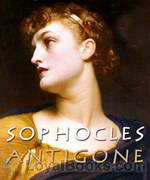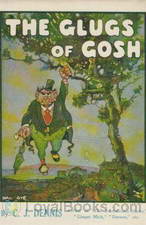|
Books Should Be Free Loyal Books Free Public Domain Audiobooks & eBook Downloads |
|
|
Books Should Be Free Loyal Books Free Public Domain Audiobooks & eBook Downloads |
|
Poetry |
|---|
|
Book type:
Sort by:
View by:
|
By: Sophocles (495-406 BC) | |
|---|---|
 Antigone
Antigone
This is the final installment in Sophocles's Theban Plays, following Oedipus Rex and Oedipus at Colonus. Oedipus's daughter Antigone deliberately breaks the laws of Thebes when she buries her brother's body and is sentenced to death. She clashes with Creon, the King of Thebes, over what constitutes justice and morality: the laws of the state or the laws of the individual. | |
By: Christopher Morley (1890-1957) | |
|---|---|
 Mince Pie
Mince Pie
Mince Pie is a compilation of humorous sketches, poetry, and essays written by Christopher Morley. Morley sets the tone in the preface: "If one asks what excuse there can be for prolonging the existence of these trifles, my answer is that there is no excuse. But a copy on the bedside shelf may possibly pave the way to easy slumber. Only a mind "debauched by learning" (in Doctor Johnson's phrase) will scrutinize them too anxiously." | |
 Songs for a Little House
Songs for a Little House
| |
By: John Greenleaf Whittier | |
|---|---|
 Snow-Bound: A Winter Idyl
Snow-Bound: A Winter Idyl
A 750-line idyllic poem about a snow-storm from the narrator’s childhood. | |
 Snow-Bound A Winter Idyll
Snow-Bound A Winter Idyll
| |
 Christmas Carmen
Christmas Carmen
John Greenleaf Whittier was an American Quaker poet and advocate of the abolition of slavery in the United States. Frequently listed as one of the Fireside Poets, Whittier was influenced by the Scottish poet Robert Burns. | |
 The Works of Whittier, Volume III (of VII) Anti-Slavery Poems and Songs of Labor and Reform
The Works of Whittier, Volume III (of VII) Anti-Slavery Poems and Songs of Labor and Reform
| |
 Anti-Slavery Poems I. From Volume III., the Works of Whittier: Anti-Slavery Poems and Songs of Labor and Reform
Anti-Slavery Poems I. From Volume III., the Works of Whittier: Anti-Slavery Poems and Songs of Labor and Reform
| |
 Anti-Slavery Poems III. From Volume III., the Works of Whittier: Anti-Slavery Poems and Songs of Labor and Reform
Anti-Slavery Poems III. From Volume III., the Works of Whittier: Anti-Slavery Poems and Songs of Labor and Reform
| |
 Songs of Labor and Reform From Volume III., the Works of Whittier: Anti-Slavery Poems and Songs of Labor and Reform
Songs of Labor and Reform From Volume III., the Works of Whittier: Anti-Slavery Poems and Songs of Labor and Reform
| |
 Anti-Slavery Poems II. From Volume III., the Works of Whittier: Anti-Slavery Poems and Songs of Labor and Reform
Anti-Slavery Poems II. From Volume III., the Works of Whittier: Anti-Slavery Poems and Songs of Labor and Reform
| |
By: C. J. Dennis (1876-1938) | |
|---|---|
 The Glugs of Gosh
The Glugs of Gosh
First published in 1917, The Glugs of Gosh satirizes Australian life at the start of the twentieth century – but the absurdities it catalogs seem just as prevalent at the start of the twenty-first. The foolishness of kings, the arrogance of the elite, the gullibility of crowds, the pride of the self-righteous, the unthinking following of tradition – all find themselves the targets of C. J. Dennis’ biting wit. | |
 The Songs of a Sentimental Bloke
The Songs of a Sentimental Bloke
The Songs of a Sentimental Bloke is a verse novel by Australian novelist and poet C. J. Dennis. The book sold over 60,000 copies in nine editions within the first year, and is probably one of the highest selling verse novels ever published in Australia.The novel tells the story of Bill, a larrikin of the Little Lonsdale Street Push, who is introduced to a young woman by the name of Doreen. The book chronicles their courtship and marriage, detailing Bill’s transformation from a violence-prone gang member to a contented husband and father. C.J. Dennis went on to publish three sequels to this novel: The Moods of Ginger Mick (1916), Doreen (1917) and Rose of Spadgers (1924) | |
By: G. K. Chesterton (1874-1936) | |
|---|---|
 Wine, Water and Song
Wine, Water and Song
A collection of 16 poems by G.K. Chesterton. All of the poems in this book, except for "The Strange Ascetic" are taken from "The Flying Inn", a book by the same author. | |
 Wild Knight and Other Poems
Wild Knight and Other Poems
A collection of poems that tend to revolve around the theme of the wonder of the world. It includes the short, poetic play, "The Wild Knight". | |
 Greybeards at Play
Greybeards at Play
G.K. Chesterton's first publication, "Greybeards at Play" is a collection of poetry and accompanying illustrations. The work is marked by the irreverent whimsy and ancient delight that would eventually be recognized as Chesterton's signature style. Short (only four poems long and a dedication), playful, and with a touch of awe, Chesterton's first piece (written at 26) is appropriately titled: it is the work of an amateur, mature in his spirit, young in his play. - | |
By: Rupert Brooke | |
|---|---|
 Collected Poems of Rupert Brooke
Collected Poems of Rupert Brooke
Rupert Chawner Brooke (August 3, 1887 – April 23, 1915) was an English poet known for his idealistic War Sonnets written during the First World War (especially The Soldier), as well as for his poetry written outside of war, especially The Old Vicarage, Grantchester and The Great Lover. He was also known for his boyish good looks, which prompted the Irish poet William Butler Yeats to describe him as “the handsomest young man in England”. | |
By: George William Russell (1867-1935) | |
|---|---|
 The Nuts of Knowledge Lyrical Poems Old and New
The Nuts of Knowledge Lyrical Poems Old and New
| |
By: Bliss Carman | |
|---|---|
 Ballads of Lost Haven: A Book of the Sea
Ballads of Lost Haven: A Book of the Sea
This collection of lyric poems evokes the sea in every line, from birth (A Son of the Sea) to death (Outbound). The smells, sights and sounds of the Canada's East Coast feature prominently. | |
By: Henry Wadsworth Longfellow (1807-1882) | |
|---|---|
 Rainy Day
Rainy Day
MANUAL OF SURGERY, OXFORD MEDICAL PUBLICATIONSBY ALEXIS THOMSON, F.R.C.S.Ed.PREFACE TO SIXTH EDITION Much has happened since this Manual was last revised, and many surgical lessons have been learned in the hard school of war. Some may yet have to be unlearned, and others have but little bearing on the problems presented to the civilian surgeon. Save in its broadest principles, the surgery of warfare is a thing apart from the general surgery of civil life, and the exhaustive literature now available on every aspect of it makes it unnecessary that it should receive detailed consideration in a manual for students... | |
By: Kabir (1440-1518) | |
|---|---|
 Songs of Kabir
Songs of Kabir
Kabir (1440 - 1518) was a mystic poet and saint of India, whose writings have greatly influenced the Bhakti movement.The name Kabir comes from Arabic Al-Kabir which means 'The Great' - the 37th Name of God in the Qur'an.Kabir was influenced by the prevailing religious mood of his times, such as old Brahmanic Hinduism, Hindu and Buddhist Tantrism, the teachings of Nath yogis and the personal devotionalism of South India mixed with the imageless God of Islam. The influence of these various doctrines is clearly evident in Kabir's verses... | |
By: Robert Williams Wood (1868-1955) | |
|---|---|
 How to Tell the Birds from the Flowers
How to Tell the Birds from the Flowers
How do you tell apart a parrot from a carrot? A plover from a clover? A bay from a jay? Although there are several ways of differentiating, R. W. Wood’s use of pun and rhyme is one of the most entertaining! | |
By: Christopher Marlowe (1564-1593) | |
|---|---|
 Hero and Leander
Hero and Leander
“Who ever lov’d, that lov’d not at first sight?” The wonder-decade of the English drama was suddenly interrupted in 1592, when serious plague broke out in London, forcing the closure of the theatres. Leading playwrights took to penning languorously erotic poetry to make ends meet: so we have Venus and Adonis, The Rape of Lucrece - and Marlowe’s blazing masterpiece, Hero and Leander. Marlowe’s poem became more notorious than either of Shakespeare’s, due not only to its homophile provocations but also to the scandal attaching to every aspect of Marlowe’s brief life, violently ended in a mysterious brawl, leaving the poem in an unfinished state... | |